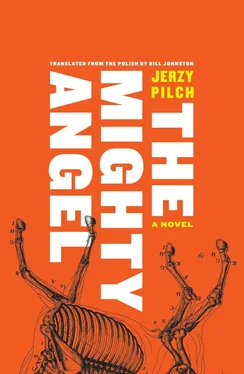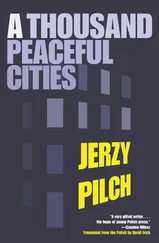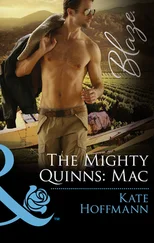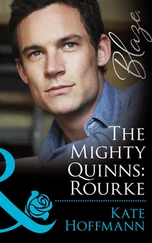“Till tomorrow then,” said Kubica, and, paying no more attention to the merchant, he left the house first.
Out in front he stooped down, took a handful of snow, and wiped his face. The merchant saw him standing motionless in the middle of the yard; he saw his snow-covered eyebrows and forehead. He didn’t go up to him, and even strayed a little from the cleared path. Once he was sure the other man was at a safe remove he said:
“Goodbye, see you tomorrow.”
Old Kubica saw nothing and heard nothing. He did not hear the bells of the merchant’s sleigh fading into the distance, and he did not see the children on their way to school. Smoke rose from the chimneys of the houses, the sound of wood being chopped came from somewhere far off, and in the forest on Ochodzita Mountain someone was calling: “Come on, come on.” An almost completely black cat was cautiously crossing the yard at a diagonal.
“Something has to be done, but what?” grandfather was saying to himself. “Something has to be done. .”
He gazed about distractedly, though not so distractedly as to look at the gate leading to the stable. At the far end of the farmyard he saw a fir tree leaning against the wall; just two weeks earlier it had been decorated with apples and candies. Christmas had come and gone, though it would have been better if it hadn’t come at all.
He had been in no state to say prayers, or to sing carols. At the Christmas Eve supper hardly anyone had spoken; the children were tearful. His heart had been like a stone exploding in the fire. Grandma Zofia served undercooked cabbage. The white-enameled serving dish of barely warm food tipped the scales toward the evil spirits; one of them entered into him. He leaned across the table, took the ill-fated vessel in his hands, and hurled it against the opposite wall, on which there hung a likeness of Martin Luther after the portrait by Cranach; the candle on the table went out, and the portrait of our reformer fell to the ground. Everyone ran away — my father always told stories about running away from Old Kubica — everyone hurried, they fled down the hallway and across the unlit yard, put the ladder against the trapdoor to the loft in the barn, and agilely climbed up one after another, like a well-trained fire brigade. Old Kubica was knocking over chairs, knocking over the table, knocking over the dresser. He took his shotgun down from the wall and summoned my ten-year-old father. They crossed the farmyard together; grandfather had the gun slung over his shoulder and a bottle in his hand, and he was singing carols:
God grant a merry eve and night.God grant a merry eve and night.First to the farmer on his farm.First to the farmer on his farm.Then to the farmer’s wife so fine.Then to the farmer’s wife so fine.And to his farmhands, good men all.And to his farmhands, good men all.
He drank from the bottle, and his splendid voice carried across the valleys. My father tried to sing too, but he was seized by a fear stronger than the twenty-below frost — the shadow of that fear would remain with him forever. At that time, on Christmas Eve in the winter of 1932 or 1933, my nine- or ten-year-old father was afraid that an angel hurrying to Bethlehem would pop out from behind one of the buildings. He was afraid that somewhere very close there was an angel who had gone astray or had decided to take a brief rest on its flight. On the night of Christmas Eve the sky was crisscrossed with angels flying in swooping arcs like swallows; on this night angels stopped in fields and flew over roofs, and a person could sometimes hear the sound of their wings and their choral singing. My father was afraid because he was convinced that Old Kubica would shoot at the angel. They’d come round the corner of the house; a white-winged creature would be standing before them under a snow-covered apple tree, and without hesitation my grandfather would take the gun from his shoulder and fire almost without taking aim, and he would hit the angel. And on its wing there would appear a single drop of blood, and that single drop would have such power that if it fell to the ground, everything would catch fire and everything would burn. Everything would catch fire, even the snow. But they made it all the way across the yard and through the orchard behind the house, and nothing happened; the fear slowly dissipated, Old Kubica’s movements became ever more sluggish. He had stopped singing and had stopped looking for the one responsible for the evil, who needed to be killed. He went back to his freezing room, stood the bottle on the floor by the iron bed, and fell asleep.
“Something needs to be done, but what?” thinks my grandfather; he gazes at the Christmas tree leaning against the wall, and he remembers the promissory note he signed right after the holiday, and he remembers the moment of hesitation before he appended his signature. Him! Him, who never hesitated, who never had doubts — he had not only had a moment of doubt before appending his desperate signature, but furthermore he had not stopped, had not drawn any inferences from his doubts. It was nothing but the devil addling his brain; nothing but the Lord God punishing him for flinging a dish of lukewarm cabbage against the wall instead of sitting quietly and praying at Christmas Eve supper. The whole farm for a single dish of cabbage, and a cold one into the bargain? What sort of accounting is that, Lord? he had asked without conviction, and the Lord with all the conviction in the world answered nothing, and in his soul Old Kubica had accepted the divine reckoning; the dish of cold cabbage was evidently the proverbial last straw that broke the camel’s back of his irascibility.
He goes into the woodshed and with both hands seizes the axe that next morning he may use to kill the merchant from Ustroń. How exactly he’ll kill him he doesn’t yet know, but he knows he’ll kill him. Details have never interested him and at the present moment they interest him even less. He doesn’t think about whether he’ll use a shotgun or an axe or a hammer; he’ll use whatever is at hand, because he always uses whatever is at hand, and if there isn’t anything at hand, he’ll do it with his bare hands. What will he do with the body of the murdered merchant? How will he do it? He won’t do anything. He’ll leave the stiff where it is and go to the pub. He’ll sit at the pub like he does every morning, except on this particular day he’ll wait there till the police come for him. When they come, he’ll go with them. Old Kubica grips the axe in his hands, and at the thought that around noon tomorrow the police will take him away, he finally feels a sense of relief.
“Yes, the police,” he whispers to himself, and unaware he is paraphrasing an as yet unknown poem, adds: “the police is always some kind of solution.”
My grandfather now hacks the branches off the fir, already knowing what he’s going to do that morning. He finds a piece of glass, some sandpaper, and a small handsaw. He’s going to carve objects out of the fir wood. Above all, he’ll make at least four rogulas . The fir is beautifully branched, like a star, and the rogulas , which resemble miniature ski poles, and which Grandma Zofia will use to stir food in the blue enameled pots, will be perfect. For an hour, or perhaps two, grandfather works with pleasure; he handles the resinous wood, the smell of the fir calms his jangling nerves, and his hands are steady. He gently removes the bark from a fir branch and, at first discordantly, like an orchestra tuning up, then more and more harmoniously, like musicians playing an overture for a grand ball, he begins to sing. After two weeks of silence my grandfather begins to sing again, and now it’s as if he were adding his voice to our choir, the choir of the alcoholics.
•
Читать дальше












